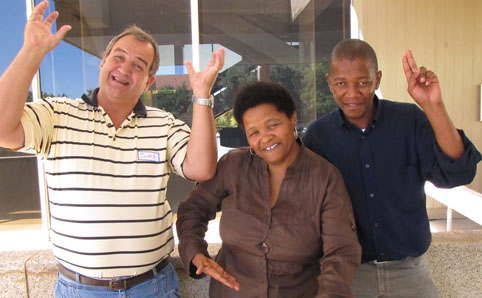 |
Signing welcome to the UFS was, from left: Sias Graig from Gauteng; Agnes Dyabuza from the Western Cape; and John Keitsemore from the Free State.
Photo: Amanda Tongha |
Plans to have the Bible translated into South African Sign Language were discussed at our university. This project is the first of its kind in the country and our university is playing an active role in it.
Representatives from various church denominations and deaf-friendly local and international organisations met on the Bloemfontein Campus. Wycliffe Bible Translators, Talking Hands, the International Missions Board and Seed, an organisation from Australia, were some of organisations represented. Representatives from Lesotho and Swaziland also attended the meeting.
Participants met for the first time in Johannesburg in October 2011. The recent meeting was to discuss the project moving forward. The translation project is expected to be completed in five years time and the final product will be released on a DVD, featuring Bible stories chronologically.
Organiser Lisa Craye says Bloemfontein was not only chosen as venue because it is central, but also because of the work that had already been done by UFS staff member Susan Lombaard. Ms Lombaard, who works at the Unit for Language Facilitation and Empowerment, did her master’s degree on the need for a Bible in South African Sign language in 2003.